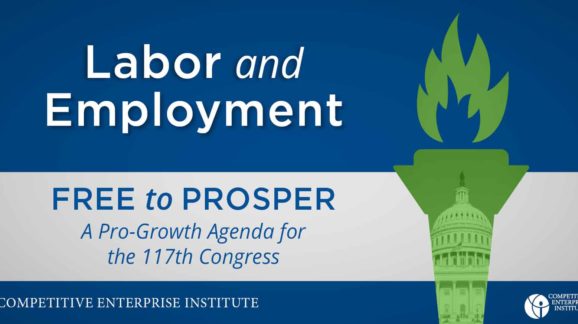Free to Prosper: Labor and Employment

View the full chapter on labor and employment here
Increases in productivity, not artificial increases in labor prices, are the key to economic growth and rising wages. For most of its history, America has enjoyed strong economic growth thanks to the flourishing of dynamic and flexible labor markets. Individuals and businesses in the United States have benefited greatly from the freedom to adapt to changing market conditions. Ensuring individual worker freedom is especially important as new business models and industries emerge. Workers’ most valuable asset is their own labor and they must be allowed to market and profit from it.
The old adversarial master–servant model of labor relations has little to offer the 21st century workforce, which is characterized by horizontal corporate structures, significant job mobility, and instant, constant communications. However, obsolete New Deal–era labor laws and regulations have yet to adapt to a changing economy. Worse, many seem intent on bending new business models to those old rules. Congress needs to revisit the whole of U.S. labor law—including the roles of the two key federal labor regulators, the National Labor Relations Board (NLRB) and the Department of Labor (DOL)—to free up the creative energies of the American labor force.
REFORM THE FAIR LABOR STANDARDS ACT
The Fair Labor Standards Act (FLSA) is the primary law governing wage and hour mandates across the country, including full- and part-time private-sector workers and local, state, and federal employees. It sets minimum wage and overtime eligibility, record-keeping requirements, and exemptions to those requirements. Through the FLSA, Congress delegated broad authority to the secretary of labor to issue regulations regarding conditions that employees must meet to achieve exempt status from the statute’s wage and hour requirements, including for minimum wage and maximum hours. Those exemptions are displayed in the FLSA’s section 213.
The labor secretary can exercise broad authority to interfere with millions of private employer–employee relationships across the country. Overreach of that power was displayed under the Obama administration. For example, in 2016, the Department of Labor dramatically raised the salary threshold for employees to be exempt from overtime pay from $23,660 to $47,476—an over 100 percent increase. As former Wage and Hour Administrator Tammy McCutchen pointed out in congressional testimony, such an increase is out of line with historical raises in the salary threshold. Such massive changes to the rules of the game burden employers with significant costs and create new compliance issues.
In this chapter:
- Reform the Fair Labor Standards Act
- Harmonize the Definition of “Employee” across Government
- Reform the Worker Classification Process
- Provide Employees Freedom to Choose among Different Types of Compensation
- Reform the National Labor Relations Act and National Labor Relations Board
- Clarify the Definition of “Joint Employment”
- Enable Voluntary Union Membership
- Rein in State Occupational Licensing Laws
- Reform the CARES Act’s “Labor Neutrality” Provision
- End Government-Subsidized Union Activity